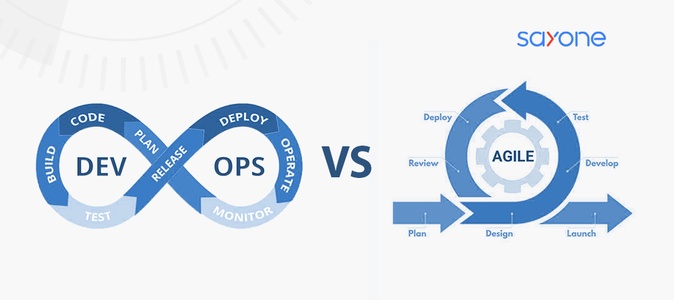DevOps VS Agile: Which one to choose & Why

Share This Article
Agile Methodologies and Frameworks
Table of Contents
Subscribe to Our Blog
We're committed to your privacy. SayOne uses the information you provide to us to contact you about our relevant content, products, and services. check out our privacy policy.
Choosing a suitable development methodology in today's fast-paced technological landscape can be crucial. DevOps and Agile stand out as two primary approaches that respond to the need for speed, flexibility, and quality. Both methodologies aim to foster collaboration and efficiency but do so in different ways.
DevOps: A practice that focuses on the automation and integration of development and operations teams. It aims to improve collaboration and streamline the development lifecycle.
Agile: A philosophy built around iterative development, where requirements and solutions evolve through collaboration. Agile promotes flexibility and rapid response to change.
For businesses seeking to hire a software consultancy firm, understanding the differences and synergies between these methodologies can guide decision-making.
The choice between DevOps and Agile may depend on project requirements, team dynamics, and organizational goals. This guide will explore both options to assist in making an informed decision.
Understanding DevOps
What is DevOps?
DevOps is a collaborative approach that unites software development (Dev) and IT operations (Ops). It aims to shorten the development cycle, increase deployment frequency, and create more dependable releases, all in parallel with your business goals and customer needs.
Definition and Principles
DevOps is defined by a culture of collaboration, where the development, operations, and other teams work in harmony. The primary principles include continuous integration, continuous delivery, automation, and a strong focus on the quality of the end product.
Continuous Integration and Continuous Delivery (CI/CD): These practices allow for frequent code changes, regular builds, and quicker releases, thus accelerating the development process.
Checkout the use of GitOps for CI/CD
Automation: Automating repetitive tasks streamlines processes and improves efficiency.
Quality Focus: Emphasizing quality ensures that the end product meets customer needs and expectations.
Key Practices and Tools
DevOps relies on several practices and tools that allow for quicker development, enhanced collaboration, and better response to market changes.
- Collaboration: Effective communication among teams is vital for quick decision-making and problem-solving.
- Monitoring and Feedback: Regular monitoring and feedback loops help in continuous improvement.
- Tool Integration: Tools like Jenkins, Docker, and Kubernetes are essential for automating different stages of the development lifecycle.
DevOps Engineers offers a flexible and adaptive approach that can be a vital asset for businesses. Its practices not only accelerate development but also ensure that the software aligns with customer demands and market trends.
Understanding Agile
What Is Agile?
Agile is a set of principles and values for software development where all requirements and solutions evolve through collaborative efforts. It emphasizes flexibility, collaboration, and customer-centricity, allowing teams to respond quickly to changes in a project's requirements.
Definition and Principles
Agile is defined by the Agile Manifesto, comprising four fundamental values and twelve principles. These values prioritize individuals and interactions, working solutions, customer collaboration, and responding to change. The principles guide practices such as daily cooperation between businesses and developers, delivering working software regularly, and maintaining a constant pace.
Agile Methodologies and Frameworks
Several methodologies and frameworks fall under the Agile umbrella:
- Scrum: A framework that divides work into sprints or iterations, focusing on teamwork and regular progress.
- Kanban: Uses visual boards to track progress and manage workflow, emphasizing continuous improvement.
- Extreme Programming (XP): Focuses on software quality and responsiveness to changing requirements.
DevOps vs Agile: Detailed Comparison
Similarities Between DevOps and Agile
Both DevOps and Agile aim to improve collaboration and efficiency in the software development process. They foster a culture of communication and collaboration among development, operations, and other key stakeholders. Flexibility and responsiveness to change are at the heart of both methodologies, and they prioritize customer satisfaction by delivering valuable products quickly.
Differences: Focus, Scope, and Implementation
- Focus: While Agile is primarily concerned with continuous improvement and flexibility in development, DevOps extends this to include both development and operations, emphasizing the entire delivery pipeline.
- Scope: Agile typically revolves around iterative development cycles known as sprints, focusing on regular feedback and continuous improvement. DevOps, on the other hand, is more comprehensive, involving the entire software lifecycle from development to deployment and maintenance.
- Implementation: DevOps often uses automation tools to streamline the development, testing, and deployment processes, promoting a more unified workflow. Agile places more emphasis on human interaction, collaboration, and adaptability within development teams.
For businesses seeking to hire an IT consultancy firm, understanding these similarities and differences is crucial in determining the right approach for your specific needs and goals. While Agile emphasizes responsiveness and continuous improvement in development, DevOps provides a more comprehensive solution that aligns development and operations. The choice between the two will depend on your organization's priorities, scale, and desired outcomes.
Checkout the Role of Microservices in DevOps
Choosing Between DevOps and Agile
Factors to Consider
- Project Needs: While Agile prioritizes incremental development and customer feedback, DevOps focuses on streamlining the delivery pipeline. If continuous delivery and deployment are crucial, DevOps holds an edge. On the other hand, if iterative development with stakeholder interaction is vital, consider Agile.
- Team Structure: DevOps promotes a culture where development and operations teams work collaboratively. Agile, generally, doesn't dive deep into operational aspects but instead stresses developer-customer collaboration.
- Tool Integration: DevOps usually demands a suite of tools to monitor, deploy, and manage applications. If your firm already possesses these tools or is ready to adopt them, it can be an advantage.
Industry Use Cases and Examples
- Start-ups and Digital Firms: Many emerging companies have found success in DevOps due to its ability to accelerate product releases and updates, helping them stay ahead in the competitive digital space.
- Large-scale IT projects: Organizations with large-scale projects benefit from Agile as it allows them to break down complex projects into manageable sprints, ensuring timely delivery with consistent stakeholder feedback.
- E-commerce Platforms: DevOps is a clear winner here. Continuous integration and continuous deployment (CI/CD) pipelines ensure that the e-commerce platforms are continuously updated, secure, and can deal with large volumes of traffic.
The choice between DevOps and Agile largely depends on your project requirements and company culture. Both approaches have their merits. However, for those looking to engage a DevOps approach, the focus on streamlined delivery and operational excellence offered by DevOps is undeniably attractive.
Read more on the Pros & Cons of Outsourcing DevOps
Integration of DevOps and Agile
How DevOps and Agile Can Work Together?
The integration of DevOps and Agile can bring out the best of both methodologies. While Agile focuses on continuous development and iterative progress, DevOps aims to streamline the development lifecycle through collaboration between development and operations. When combined, they create a cohesive process where development, testing, and deployment work in a well-coordinated manner.
- Collaboration: DevOps focuses on open communication and collaboration between different teams, aligning with Agile's emphasis on teamwork.
- Automation: By employing Devops automation tools in both development and operations, the combination of DevOps and Agile speeds up the process and makes it more reliable.
- Adaptability: The flexible nature of Agile complements DevOps by allowing quick changes and adaptability to new requirements, making the overall process more responsive.
Benefits and Challenges of Integration
The integration of DevOps and Agile is not just a merging of methodologies; it's a strategic decision that can improve the software development process in many ways.
By understanding how they can work together and what the benefits and challenges might be, businesses can make an informed choice that help achieve their goals and requirements. Let's explore the numerous advantages of DevOps - Agile integration in your workflow.
Benefits:
- Speed: Faster delivery of high-quality software that meets customer demands.
- Quality: Improved quality control with continuous testing and integration.
- Alignment: Closer alignment between development, operations, and business goals.
Challenges:
- Cultural Shift: Adjusting to a new way of working and thinking might be a hurdle.
- Coordination: Managing the collaboration between diverse teams can be complex.
- Tools and Training: Selecting the right tools and providing appropriate training to the teams might require careful consideration.
The Future of DevOps and Agile
Trends and Developments
With passing years, software development continues to evolve rapidly, with new emerging technologies like Artificial intelligence – both DevOps and Agile methodologies are at the forefront of this evolution. DevOps, with its focus on collaboration and continuous delivery, is becoming a standard in many organizations. Agile, with its adaptive planning and flexible response to change, remains central to team collaboration and customer satisfaction.
Impact on Industry and Teams
Companies are recognizing the benefits of adopting DevOps and Agile principles to adapt to market demands and increase productivity. In various industries, from finance to healthcare, these practices allow teams to respond to customer needs more quickly and build better products. They foster collaboration across departments and break down traditional silos, leading to a more responsive and cohesive approach to project development.
Impact of AI
Artificial Intelligence (AI) is playing a role in automating many routine tasks, enabling teams to focus on more complex issues. In DevOps, AI can automate parts of the development cycle, from testing to deployment, improving efficiency and reducing human error. Agile teams also benefit from AI-driven data analysis, which helps in better understanding customer behavior and tailoring products accordingly.
DevOps VS Agile: A Short Summary
Both DevOps and Agile offer unique strengths that cater to different organizational needs. DevOps shines with its emphasis on collaboration and integration, creating a more unified and streamlined process. Agile, on the other hand, provides flexibility and adaptability, focusing on customer feedback and iterative improvement.
The choice between DevOps and Agile depends on your organization's specific needs and goals. However, in the future landscape, DevOps is emerging as a key player, contributing positively to business growth and team collaboration.
If you're looking to transform your business with modern methodologies, consider partnering with SayOne Technologies, a DevOps & Software Consultancy firm with years of experience. We align our practices with your business needs, ensuring you stay ahead in the ever-changing tech landscape. Contact SayOne today to take your development processes to the next level.
Share This Article
Subscribe to Our Blog
We're committed to your privacy. SayOne uses the information you provide to us to contact you about our relevant content, products, and services. check out our privacy policy.

